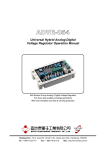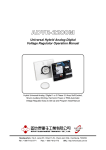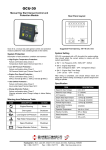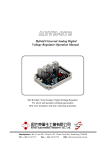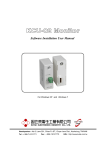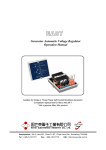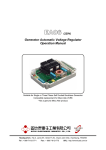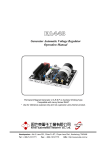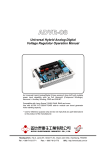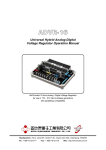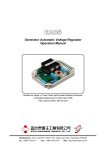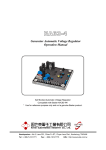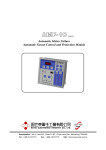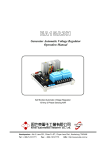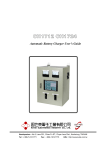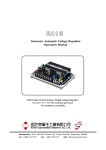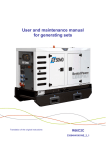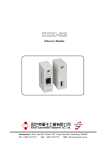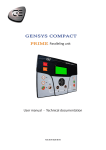Download User Manual
Transcript
ADVR-12 Universal Hybrid Analog-Digital Voltage Regulator Operation Manual Self Excited Automatic Voltage Regulator For use in Brushless SHUNT, PMG and Auxiliary Winding Compatible with Basler* AVC63-12, AVC125-10, CATERPILLAR* VR6, Kato* K65-12B & K125-10B, Leroy Somer* 202-8634 regulators * Used for reference purposes only and does not imply that any part listed above is the product of the manufacturer. Headquarters : No.3, Lane 201, Chien Fu St., Chyan Jenn Dist., Kaohsiung, TAIWAN Tel : + 886-7-8121771 Fax : + 886-7-8121775 URL : http://www.kutai.com.tw SECTION 1 : SPECIFICATION Sensing Input (20, 22, 24) Voltage 220 − 520 Vac 1- or 3- phase selectable 180 − 260 Vac @ 220 Vac 330 − 520 Vac @ 440 Vac Frequency 50 / 60 Hz selectable Power Input (26, 28, 30) Voltage 60 − 300 Vac, 1 or 3 phase Frequency 40 − 500 Hz Output (F1, F2) Voltage 63 Vdc @ power input 110 Vac 1 Phase 75 Vdc @ power input 110 Vac 3 Phase 125 Vdc @ power input 220 Vac 1 Phase 150 Vdc @ power input 220 Vac 3 Phase Current Continuous 12A Intermittent 20A for 10 sec. Resistance ≧ 5 ohms @ power input 110 Vac ≧ 11 ohms @ power input 220 Vac Fuse Spec. 6.3 x 32mm 12.5A / 500V (slow blow type) External Voltage Adjustment 10K ohms 1 watt potentiometer Soft Start Ramp Time 4 sec. Unit Power Dissipation Max.12 watts EMI Suppression Internal EMI filtering Quadrature Droop Input (C1, C2) CT 1A / 5A Max. +/- 5% @ P.F +/- 0.7 Input > 5VA Analogue Input (2, 3) Un 0 − 10% @ 0 − 10 Vdc or +/- 5 Vdc Over Excitation Protection Inverse-time 125 +/- 5 Vdc @ power input 220 Vac Under Frequency Protection (Factory Knee Point Setting) Burden in SHUNT & PMG Wiring 1320 VA @ power input 110 Vac 2640 VA @ power input 220 Vac Voltage Regulation < +/- 0.5% ( with 4% engine governing ) Typical System Response AVR response 20ms Build Up Voltage Residual voltage at AVR power input terminal > 6 Vac @ 25 Hz Thermal Drift 0.03% per °C change in AVR ambient 50 Hz system presets knee point at 47 Hz 60 Hz system presets knee point at 57 Hz Knee point Frequency Drift:0.1 Hz @ -40 - +70 °C Environment Operating Temperature Storage Temperature Relative Humidity Vibration -40 − +70 ˚C -40 − +85 ˚C Max. 95% 3 Gs @ 100 − 2K Hz Dimensions 214.0 (L) x 163.0 (W) x 45.7 (H) mm Weight 1130 g +/- 2% ___________________________________________________________________________________________ 2 ADVR-12 SECTION 2 : FIGURE / SIZE REFERENCE 163.0 140.0 45.7 22.0 7.2 2 214.0 191.0 1 24.9 Figure 1 Outline Drawing 91.3 ATTENTION 1. AVR can be mounted directly on the engine, genset, switchgear, control panel, or any position that will not affect operation. For dimension reference please see Figure 1. 2. All voltage readings should be taken with an average-reading voltmeter. Megger or high-potential test equipment must not be used. Use of such equipment could damage the AVR. 3. Secure all wiring connections. Do not install AVR in a high vibration area to avoid loose connections. For safety do not touch the heat sink while in operation. 2 F- 1 SECTION 3 : DIP SWITCH PROGRAMMING & ADJUSTMENTS F+ Power Sensing Figure 2 ___________________________________________________________________________________________ ADVR-12 3 3.1 3.2 DROOP Adjustment (DROOP) When operating in parallel the AVR increases or decreases its voltage output when phase current leads or lag the voltage. The range of this increase or decrease can be preset by the DROOP adjustment. Voltage Adjustment (VOLT) Generator rated output voltage adjustment. Must be in agreement with the DIP Switch SW5 voltage range setting. 180 − 260 Vac @ 220 Vac SW5 OFF 330 − 520 Vac @ 440 Vac SW5 ON 3.3 Under Frequency Adjustment (U/F) When generator RPM falls below the knee point, the under frequency protection circuit will activate and the voltage and frequency begin to decrease in linear descend. SECTION 4 : CONNECTION TERMINAL TERMINAL CH GND 2 3 4 5 5a 6 6a 7 Select frequency 50 Hz or 60 Hz according to the generator in use. 8 3.4 Stability Adjustment (STAB) Correct adjustment of STAB setting must be conducted while the generator is operating without load. First adjust the STAB potentiometer (POT) clockwise to the point the voltage becomes unstable, then adjust it back slightly, anti-clockwise (About 1/5 turn). This is point the voltage just reaches the critical point (Knee point) of stabilization, where the voltage is stable yet very close to becoming unstable. 3.5 TRIM Adjustment (TRIM) When terminals 2 & 3 are biased with a DC voltage (-5 − +5V), the TRIM is used to adjust the influence this DC has on the output voltage of the AVR. If the TRIM (POT) is adjusted fully counter-clockwise the AVR DC output will not be influenced by any bias voltage. Conversely, if the TRIM is adjusted fully clockwise, then any signal will produce the maximum 10% effect. 3.6 U/F DIP Adjustment (DIP) When U/F protection is activated-, the voltage droop ratio can be adjusted via the DIP VR. The adjustable range is 3 − 10 V/Hz. 3.7 Over Excitation LED (O/E) Indicator illuminates when the generator is in Over-Excitation protection. 3.8 Under Frequency Protection LED (U/F) Indicator illuminates when the generator is in U/F Under-Frequency protection. 9 20 22 24 26 28 30 F1 F2 DESCRIPTION Ground Analogue Voltage Input Connect 4 & 7 for onboard voltage adjustment. Connect 10K ohm VR to 6a & 7 for external voltage adjustment. (keep 4 & 7 Open) Current Transformer (CT) 1A input Current Transformer (CT) 5A input Current Transformer (CT) common Bridge selection common Connect 4 & 7 for onboard voltage adjustment. Connect 10K ohm VR to 6a & 7 for external voltage adjustment. (keep 4 & 7 open) No use (Null) Connect 9 & 6a for 3 phase sensing connect. Keep 9 & 6a open for single phase sensing Single or Three phase sensing input Single or Three phase sensing input Three phase sensing input Connect 22 & 24 for Single phase sensing input Three phase power input Single or Three phase power input Single or Three phase power input Positive excitation output (+) Negative excitation output (-) ___________________________________________________________________________________________ 4 ADVR-12 SECTION 5 : WIRING CONNECTIONS 4-7 Close : Internal VR Adj. 5-6 : 1A CT External VR 10K Ohm 5a-6 : 5A CT 6a-9 Close : 3 Phase Sensing 6a-9 Open : 1 Phase Sensing CH GND 2 3 5 5a 6 6a 7 4 2-3 : +/-5Vdc Analog Input 22 CH GND 9 Power 24 26 28 2 3 5 5a 6 6a 7 4 2-3 : +/-5Vdc Analog Input ADVR-12 Sensing 20 8 F1 F2 F+ 20 9 ADVR-12 Sensing 30 8 Power 22 24 26 28 30 F- F1 F2 F+ F- FIELD R R CT CT S GEN S T GEN PMG FIELD T Figure 3 Three Phase Sensing SHUNT CH GND 2 3 4 5 5a 6 6a 7 8 Figure 4 Single Phase Sensing PMG or Auxiliary Winding CH GND 9 2 3 4 20 22 Sensing Power 24 26 28 30 F1 20 F2 F+ PT1 8 9 ADVR-12 ADVR-12 Sensing 5 5a 6 6a 7 22 Power 24 26 28 30 F1 F2 F+ F- PT2 F- PT1 FIELD R R CT CT S S GEN T T Figure 5 Three Phase Sensing with power transformer (If sensing or power voltage differs from ADVR-12, add PT1 or PT2.) GEN PMG FIELD Figure 6 PMG or Auxiliary Winding with power transformer (If sensing voltage differs from ADVR-12, add PT1.) ATTENTION 1. 2. 3. 4. 5. 6. All AC voltage readings are average value only. When setting external VR (open 4-7), the Internal VR will be invalid. External voltage regulator: 10K ohms, 1 watt. Adjustable range is the same "VOLT" range. Sensing Voltage can be set from 220 − 440 Vac Program SW5 correctly. For single phase sensing bridge 20 & 22 and open 6a & 9. When using PT1 of capacity >100VA, must pay attention that the voltage and capacity of transformer PT2 has adequate excitation output. ※ Use only replacement fuses specified in this user manual. ※ Appearance and specifications of products are subject to change for improvement without prior notice. ___________________________________________________________________________________________ ADVR-12 5





